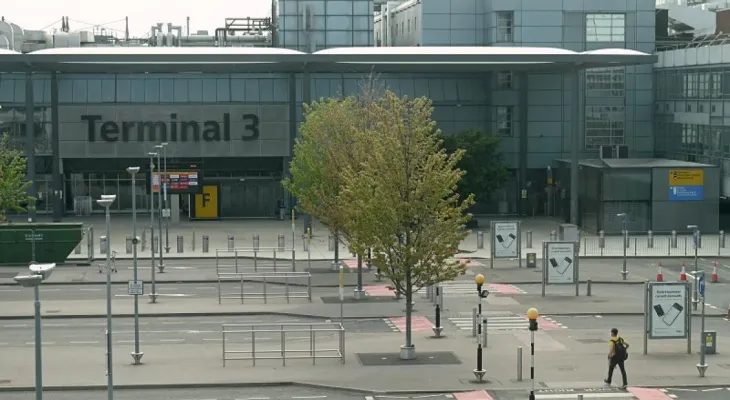Search here
Newspaper
Search here

Arab Canada News
News

Published: September 9, 2023
A new chapter in the saga of crumbling concrete in buildings across Britain emerged today, Friday, with Heathrow and Gatwick airports confirming that parts of their facilities are built using lightweight material at risk of collapse.
A spokesperson for Heathrow Airport stated that the authorities are aware of the remedial steps that should be taken in buildings that contain "reinforced autoclaved aerated concrete" and are taking necessary measures to mitigate its risks, according to what the British Sky News channel reported.
"Reinforced autoclaved aerated concrete" is abbreviated as RAAC (Reinforced Autoclaved Aerated Concrete), a type of concrete filled with air bubbles and weighing about a quarter of the weight of regular reinforced concrete, used commonly from the 1950s to the mid-1990s before it was found to be at risk of collapse.
The concrete was discovered in Terminal 3 at Heathrow Airport, and necessary measures have been taken while the matter is resolved permanently.
Similarly, a spokesperson for Gatwick Airport confirmed that its management maintains a record of locations containing this lightweight concrete on the airport premises and regularly monitors them closely, emphasizing that the recent inspection revealed no current safety concerns.
While this material raises concerns in poorly maintained buildings, its risks are significantly lower in airports, as these facilities spend significant funds on maintenance compared to public buildings, experts confirmed to the Financial Times.
This lightweight and inexpensive concrete was widely used in construction from the 1950s to the mid-1990s before it was found to lose its strength over time.
British Education Secretary Gillian Keegan recently brought up this issue after calling for more than 100 schools to close sections of their buildings that contain this type of concrete, based on new directives issued by the ministry to minimize risk as much as possible.
With ongoing inspections of buildings, the number of schools forced to close parts of their facilities is expected to rise.
School Repairs
Reports indicate that the British Department for Education will allocate funds from its existing capital budget to repair school buildings at risk of collapse.
Finance Minister Jeremy Hunt pledged last Sunday to "spend what it takes" to ensure classrooms are safe, after a significant number were forced to close as the new school term began due to concerns about reinforced autoclaved aerated concrete.
The Finance Minister reassured parents and spoke about conducting a
"comprehensive survey" to identify buildings that pose safety risks, amidst accusations that ministers had not acted swiftly enough to mitigate dangers raised as far back as 2018.
During his appearance on the program "Sunday With Laura Kuenssberg" on BBC, Mr. Hunt did not speculate on the costs associated with fixing the issue but said, "We will spend whatever it takes to ensure our children attend school safely, yes."
Later, sources from the Finance Ministry indicated that repair costs could be covered by the capital budget already existing in the Department for Education.
The government has asked over 100 schools and colleges to close their buildings, either fully or partially, following the collapse of a beam previously estimated to be safe.
State Schools Minister Nick Gibb acknowledged the possibility of more classrooms being closed, while Mr. Hunt stated that additional structural problems may arise in the "weeks or months" ahead.
Immediate Action
The Finance Minister said that Education Secretary Gillian Keegan "acted immediately" after receiving new information during the summer regarding the potential risk posed by reinforced autoclaved aerated concrete, a lightweight material that continued to be used in construction until the mid-1990s.
Questions remain about how complicated this issue might be due to the presence of "asbestos" [a fibrous mineral used in construction materials] in schools and other public buildings.
Speaking on Sunday, the Finance Minister stated that the government would act "whether it pertains to reinforced autoclaved aerated concrete or the broader asbestos problem [a material that causes lung disease]," pledging to "do everything possible to ensure children's safety."
In his remarks on the program "Sunday With Trevor Phillips" on Sky News, he said, "We have 22,000 schools in the country, and since that incident, we have implemented a massive program to identify the issues with reinforced autoclaved aerated concrete and asbestos, prioritizing the safety of every child."
However, trade unions were angered by the confusion surrounding the determination of costs that would be borne by the central government.
The government previously tried to alleviate negative reactions by amending its guidelines to indicate that it would cover the costs of temporary accommodations outside of schools.
Comments